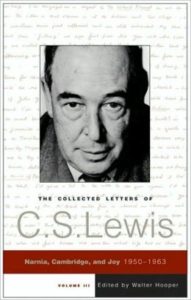 Reading C. S. Lewis’s letters to Americans while researching my book was a daily joy. I’ve always loved research, but this was especially delightful. One of Lewis’s many American correspondents was Mary Willis Shelburne.
Reading C. S. Lewis’s letters to Americans while researching my book was a daily joy. I’ve always loved research, but this was especially delightful. One of Lewis’s many American correspondents was Mary Willis Shelburne.
Shelburne wrote more letters to Lewis than any other American correspondent; consequently, he wrote more to her than any other, since he felt duty-bound to respond to each letter he received. It is quite clear by the tone of the correspondence that she was an increasingly needy person, both financially and spiritually. Her anxieties seemed to be legion, and Lewis did his best to address them with tact and empathy.
Did he ever tire of her constant flow of letters seeking help? There are indications that she could sometimes wear him down with her incessant demands for answers. Despite the temptation to be frustrated with her, he nevertheless maintained the ministry to which God had called him.
Shelburne feared death, a topic he dealt with more often as both grew older and Lewis began to feel his own mortality. He did his best to help Shelburne face her own demise with the proper Christian spirit and perspective.
He joked about imminent death in a 1957 letter thusly: “What on earth is the trouble about there being a rumour of my death? There’s nothing discreditable in dying: I’ve known the most respectable people do it!”
Commenting in another letter on horrible visits to the dentist, he told her to keep in mind they both had to recognize that “as we grow older, we become like old cars—more and more repairs and replacements are necessary. We must just look forward to the fine new machines (latest Resurrection model) which are waiting for us, we hope, in the Divine garage!”
And why not have the same attitude as the apostle Paul? “If we really believe what we say we believe—if we really think that home is elsewhere and that this life is a ‘wandering to find home,’ why should we not look forward to the arrival.”
He kept his sense of humor even as he suffered greater physical distress, telling her, with respect to their bodies, “Like old automobiles, aren’t they? Where all sorts of apparently different things keep going wrong, but what they add up to is the plain fact that the machine is wearing out. Well, it was not meant to last forever. Still, I have a kindly feeling for the old rattle-trap.”
In his final year, Lewis’s comments on death appeared more frequently, as he sensed his time was near. A letter in June remarked on her obvious fear of dying; Lewis’s response was the most direct one yet:
Can you not see death as the friend and deliverer? It means stripping off that body which is tormenting you: like taking off a hair-shirt or getting out of a dungeon. What is there to be afraid of? . . . Has this world been so kind to you that you should leave it with regret? There are better things ahead than any we leave behind. . . . Of course, this may not be the end. Then make it a good rehearsal. Yours (and like you a tired traveler near the journey’s end).
Shelburne outlived Lewis, but one hopes his constant reminders about how Christians should view death helped her as she later stood on the brink of eternity.
